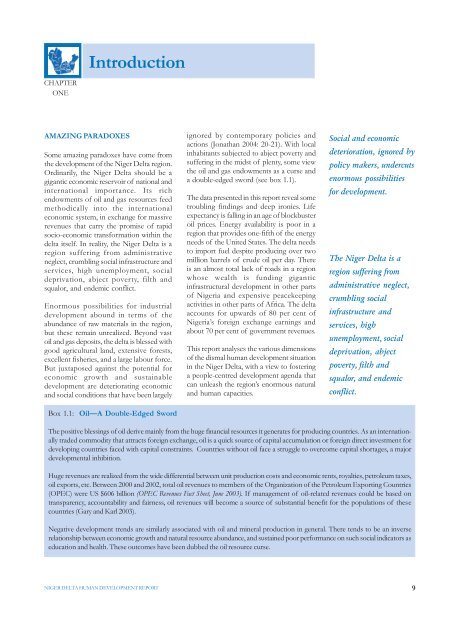Niger Delta Human Development Report - UNDP Nigeria - United ...
Niger Delta Human Development Report - UNDP Nigeria - United ...
Niger Delta Human Development Report - UNDP Nigeria - United ...
You also want an ePaper? Increase the reach of your titles
YUMPU automatically turns print PDFs into web optimized ePapers that Google loves.
CHAPTER<br />
ONE<br />
Introduction<br />
AMAZING PARADOXES<br />
Some amazing paradoxes have come from<br />
the development of the <strong>Niger</strong> <strong>Delta</strong> region.<br />
Ordinarily, the <strong>Niger</strong> <strong>Delta</strong> should be a<br />
gigantic economic reservoir of national and<br />
ignored by contemporary policies and<br />
actions (Jonathan 2004: 20-21). With local<br />
inhabitants subjected to abject poverty and<br />
suffering in the midst of plenty, some view<br />
the oil and gas endowments as a curse and<br />
a double-edged sword (see box 1.1).<br />
Social and economic<br />
deterioration, ignored by<br />
policy makers, undercuts<br />
enormous possibilities<br />
international importance. Its rich<br />
endowments of oil and gas resources feed<br />
methodically into the international<br />
economic system, in exchange for massive<br />
revenues that carry the promise of rapid<br />
socio-economic transformation within the<br />
delta itself. In reality, the <strong>Niger</strong> <strong>Delta</strong> is a<br />
region suffering from administrative<br />
neglect, crumbling social infrastructure and<br />
services, high unemployment, social<br />
deprivation, abject poverty, filth and<br />
squalor, and endemic conflict.<br />
Enormous possibilities for industrial<br />
development abound in terms of the<br />
abundance of raw materials in the region,<br />
but these remain unrealized. Beyond vast<br />
oil and gas deposits, the delta is blessed with<br />
good agricultural land, extensive forests,<br />
excellent fisheries, and a large labour force.<br />
But juxtaposed against the potential for<br />
economic growth and sustainable<br />
development are deteriorating economic<br />
and social conditions that have been largely<br />
The data presented in this report reveal some<br />
troubling findings and deep ironies. Life<br />
expectancy is falling in an age of blockbuster<br />
oil prices. Energy availability is poor in a<br />
region that provides one-fifth of the energy<br />
needs of the <strong>United</strong> States. The delta needs<br />
to import fuel despite producing over two<br />
million barrels of crude oil per day. There<br />
is an almost total lack of roads in a region<br />
whose wealth is funding gigantic<br />
infrastructural development in other parts<br />
of <strong>Niger</strong>ia and expensive peacekeeping<br />
activities in other parts of Africa. The delta<br />
accounts for upwards of 80 per cent of<br />
<strong>Niger</strong>ia’s foreign exchange earnings and<br />
about 70 per cent of government revenues.<br />
This report analyses the various dimensions<br />
of the dismal human development situation<br />
in the <strong>Niger</strong> <strong>Delta</strong>, with a view to fostering<br />
a people-centred development agenda that<br />
can unleash the region’s enormous natural<br />
and human capacities.<br />
for development.<br />
The <strong>Niger</strong> <strong>Delta</strong> is a<br />
region suffering from<br />
administrative neglect,<br />
crumbling social<br />
infrastructure and<br />
services, high<br />
unemployment, social<br />
deprivation, abject<br />
poverty, filth and<br />
squalor, and endemic<br />
conflict.<br />
Box 1.1: Oil—A Double-Edged Sword<br />
The positive blessings of oil derive mainly from the huge financial resources it generates for producing countries. As an internationally<br />
traded commodity that attracts foreign exchange, oil is a quick source of capital accumulation or foreign direct investment for<br />
developing countries faced with capital constraints. Countries without oil face a struggle to overcome capital shortages, a major<br />
developmental inhibition.<br />
Huge revenues are realized from the wide differential between unit production costs and economic rents, royalties, petroleum taxes,<br />
oil exports, etc. Between 2000 and 2002, total oil revenues to members of the Organization of the Petroleum Exporting Countries<br />
(OPEC) were US $606 billion (OPEC Revenues Fact Sheet, June 2003). If management of oil-related revenues could be based on<br />
transparency, accountability and fairness, oil revenues will become a source of substantial benefit for the populations of these<br />
countries (Gary and Karl 2003).<br />
Negative development trends are similarly associated with oil and mineral production in general. There tends to be an inverse<br />
relationship between economic growth and natural resource abundance, and sustained poor performance on such social indicators as<br />
education and health. These outcomes have been dubbed the oil resource curse.<br />
NIGER DELTA HUMAN DEVELOPMENT REPORT<br />
9










